Love Is… Part 3: Sunrays
by Lydia Floren

by Lydia Floren
When you think of “love,” what comes to mind? Candle-lit dinners? Moonlight walks on the beach? Gifts that begin with Kay? In our world the word “love” covers a lot of territory. Love can describe anything from a romantic infatuation to a food preference. According to Webster, love is defined as “a warm attachment, enthusiasm or devotion,” or “unselfish…concern for the good of another.”
“Love means intimacy, closeness, mutual vulnerability, and a deep sense of safety.” Henri Nouwen
“Acceptance of the other, whatever he is.” Anais Nin
“To love at all is to be vulnerable.” CS Lewis
“Genuine love is honor put into action regardless of the cost.” Gary Smalley and John Trent
“Love is a decision.” Smalley and Trent
“Love is a choice you make everyday.” Gary Chapman
“Love is a verb.” Chapman
“Love has nothing to do with what you are expecting to get — only with what you are expecting to give — which is everything. “ Katharine Hepburn
“Love is not obligation done with a cold soul. It is when one person believes in another person and shows it.” Rabbi David Wolpe.
“[God’s] love is not a passing fancy or a superficial emotion; it is a profound and unshakable commitment that seeks what is best for us.” Billy Graham
Love is “a warm attachment, enthusiasm or devotion.” Webster
Love is “unselfish…concern for the good of another.” Webster
Read “Love Is… Part 1” here.
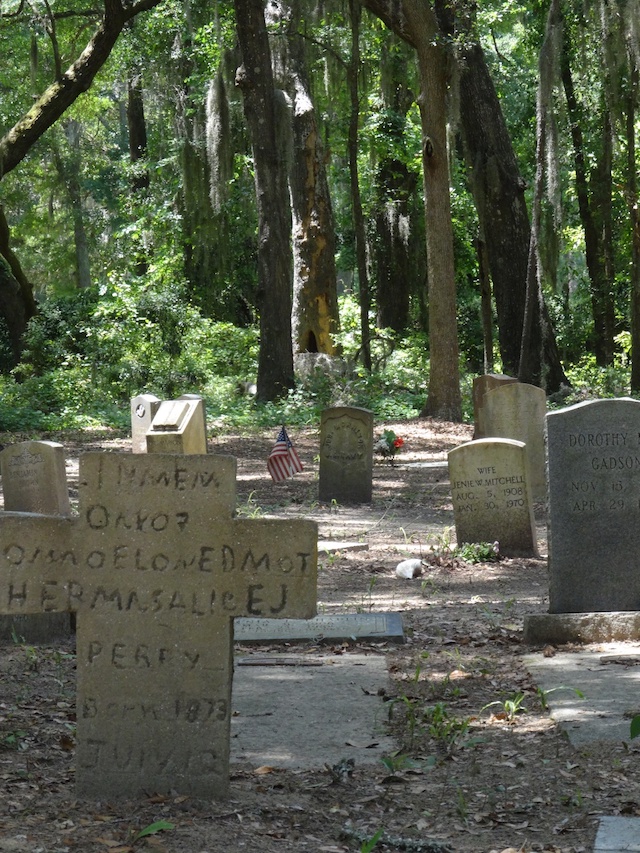 Love Is…
Love Is…Have you ever attended a funeral where you pulled out a piece of paper and started taking notes? Weird, right? Well, I can remember one time when I did just that. I was attending the memorial service for Mary Markquart, the mother in law of my dear friend, Terri. About halfway through the remarks, I grabbed a pen from the pew in front of me and started jotting things down on my program. By the end, I had filled every available space with my scribbles.
Let me back up.
Three years earlier, Terri Markquart, called to tell me that her mother-in-law was just diagnosed with ovarian cancer, a grim diagnosis with limited life expectancy.
Many people, including Terri and I, were praying for Mary and her family. From time to time, Terri would give me an update. By God’s strength, Mary survived surgery and several rounds of chemo, allowing her more time – more good quality time – with her loved ones, than anyone dared hope for. Mary was able to attend the weddings of two of her grandchildren, and finally, in her last days, she witnessed the nuptials of her only daughter. As her time approached, which was remarkably free of pain, she was able to say good-bye to everyone she most cared about. And ,when she was unable to talk, she could still say “I love you.” With those words on her lips–“I love you“– she slipped into the next life as graciously as she had traveled through this one.
At Mary’s funeral, people remarked, not as much on Mary’s accomplishments –though there were many–, but more on her character. They shared who she was, not what she had done: Mary was gracious, kind, and compassionate. She was generous, hospitable, and interested in people. And she was a person of deep faith.
The last person to speak was her minister. “I am reading from Mary’s underlined patched-together Bible,” he said as he held it up. “One passage that Mary clearly loved was 1 Corinthians 13:4-8:
“Believe it or not,” he continued, “as much as these words describe Mary’s life, she did not mark up these verses in her Bible nearly as much as she did the first few words of the next chapter.”
He paused, and then smiled.
“1 Cor 14:1 begins with this little phrase: ‘Make love your aim.’
“This sums up Mary’s life. She lived her life focused on love.”
What does it mean to make love your goal in life?
by Lydia Floren
“God has a plan for your life.” For many people, this is a reassuring thought. But not for me. This idea of God having a plan for me has always been a little unsettling. Because I know how many ways I can screw thing up. For example, what if I think I’ve figured out God’s plan for me, but I misunderstand, and unintentionally set out in the wrong direction? Does that mean the train has left the station? That I am now consigned to live the rest of my life on a backup plan? Plan B?
And even if I feel like I’ve “gotten the memo,” and have a good idea of what His plan is, what if I just decide one day – as I’m prone to do – that I’m going to ditch His plan and go my own way? Am I on to plan C, or D, ….or Z?
Thankfully, God gets us. He knows we mess up. Regularly. He understands that we don’t always hear Him clearly. And he knows that we can wander way off base, out of ignorance, or just from pure orneriness. If – no,when – we do, He doesn’t relegate us to life in the loser’s bracket, to live a kind of a cosmic, “consolation prize” existence.
He just keeps on loving us, reaching out to us, calling us back to the one and only plan He has for us. His Plan A.
So what exactly is God’s Plan A?
Who wouldn’t want that kind of life?
Have you gotten off track? Have you quit listening for God’s direction, or maybe just decided to go your own way for awhile? Well, quit messing around and get back on track. Claim the good life, the overflowing life, the life of love God has planned for you.
Come back to God’s Plan A.
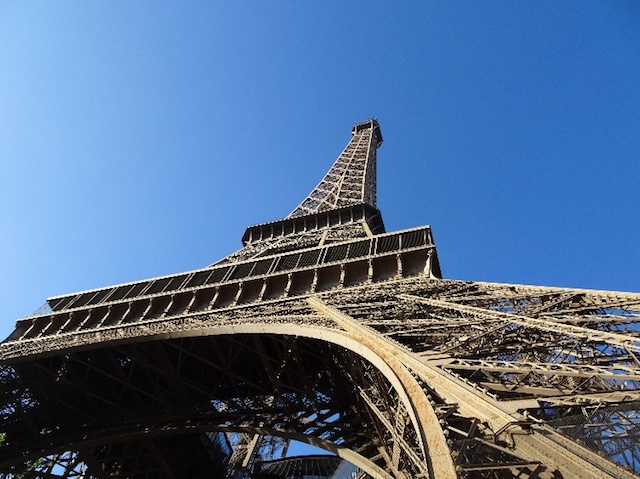 Discovering Paris
Discovering ParisParis has long been on my bucket list. So, last year in celebration of our 30th wedding anniversary, Andrew and I finally set aside a week to visit this famous place. We stayed at an Airbnb, a 200+ year old walkup apartment in Marais, right in the heart of the city. From this prime spot, under the guidance of our dear friend Jenn, we proceeded to take in the sites and sounds of Paris. We breakfasted on quiche at the patisserie across the street. We strolled down cobblestone streets, and we sipped spiced wine at sunset on Mont Marche We peeked through a clock-face of the Musee D’Orsay and snacked on crepes from a roadside vendor. We crossed the Seine via the Pont Neuf, and gazed down the Hall of Mirrors in Versailles. And, we smiled (back) at Mona Lisa.
And, of course, we (mostly me) took lots of pictures.
Paris truly exceeded my expectations. But I never expected that it would change me the way it did. After being there a few days I started to see that In Paris, folks didn’t seem to be in a hurry. Despite the December chill, hundreds of people would sit for hours in outside cafes chatting while they sipped coffee or a glass of wine. No one gave more than a passing glance to their cellphones. I don’t remember seeing a TV. Anywhere. As I watched the way Parisians lived, I began to see how isolated my life had become, how isolating our culture tends to be. And rushed.
Parisians by their example, reminded me to live my life more relaxed, more connected and less distracted.
But Paris is not the real world, at least not my world. In that world I have responsibilities: houses to clean, jobs to do, children to tend. It didn’t take me long to plunge again into that Life. But often in the ordinary days I would find myself drifting back back to our time in Paris, and I would feel my heart smile. I would remember again that finding joy in life is not about what I do as much as how I do it.
And I would remind myself that
There is time, if I will take it, to linger over dinner, share a laugh, snap a picture.
There is resolve, if I will use it, to turn off my cellphone and clear my over-busy schedule.
There is opportunity, if I will grab it, to savor the moment, to soak in the beauty, and—most of all—to enjoy the relationships I have been given along the way.
Paris….it’s been awhile. My heart still smiles.
For more, read Breathe Series Part 1, and Breathe Series Part 2
 Breathing In God’s Presence: Breathe Series, Part 2
Breathing In God’s Presence: Breathe Series, Part 2by Lydia Floren
I eat fast. Too fast. I’ve mentioned this before 😊. When I eat quickly, I do so for one reason: so that I will no longer feel hungry. I get that. But in order to “experience” a meal (as I think most foodies must do) I’ve learned it is important to slow down. When I do, I can appreciate the tastes that cross my palate, the combination of flavors and textures. And eating slowly gives me the opportunity to enjoy my dinner companions. I have found that when I “dine” like this, the whole experience – delicious and delightful – becomes imprinted in my memory. So, whenever I think about it, it brings a smile to my face.
That is what meditating on God’s word is.
I know, I know. I’m just like you. When I think of meditation, I envision eyes closed, legs crossed, elbows on knees, fingers touching, humming to new-age music. But Christian meditation is far different. It is not emptying the mind but filling it with the truth – and the Presence – of the One God.
When we focus on one or two verses, or even one or two words from the Bible we are able savor the truth offered to us. For example, a few years ago my friend Debra was going through a very difficult time. She told me later that these nine words were her lifeline: “The Lord is my shepherd, I shall not want.”
Here are links to some other examples of meditation:
Christian meditation involves spending some time in solitude and silence, thinking about just a few verses, or part of one verse. When we do this, we experience God’s presence and taste His fruit. And that experience lingers in our memory. Every time it comes to mind, it lifts our hearts and makes us smile.
So take time every day to partake of the rich meal God has set before you. Take a bite, and then another. Relish the food and the conversation. Enjoy the company of The Most Amazing Person in the Universe, the one who knows you best and loves you most.
“My cup overflows.” Psalm 23
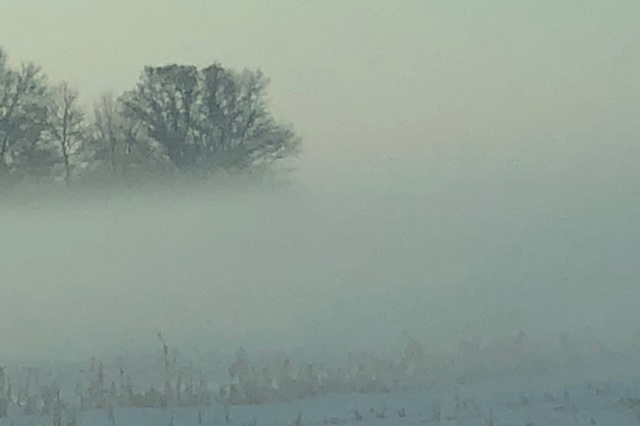 Breathe. Just Breathe. (Breathe Series, Part 1)
Breathe. Just Breathe. (Breathe Series, Part 1)by Lydia Floren
Depression took me by surprise. I’d never struggled with that particular problem. Anxiety, yes. But the overwhelming feeling of gloom and doom, the closing in, even the belief that the world might be a better place if you weren’t in it? That I had not experienced, at least until last year.
At first, I didn’t even realize what was happening. It would come and go. A feeling of hopelessness. A lack of energy. Unexplained tears. Even after I connected the dots and figured out I was depressed, it took me awhile to pinpoint what might be triggering it. For me it was light—or rather, the lack of light. A particularly overcast summer introduced a shroud of sadness into my life. It clung to me as the days grew shorter and shorter, near-paralyzing me as its tenacles tightened.
How does one survive such oppression? Such a threat to one’s vitality? I know as a physician (and now, through experience) that there are lots of things that can help: a special light in the morning, medication to change the brain chemistry, regular exercise, a healthy diet, positive people, connecting with God every day.
But some days are just hard. A friend who has struggled with depression for years once explained it like this:
“Some days you just breathe. All you are supposed to do that day—all you CAN do—is take your next breath.”
Breathe. Just breathe.
You may be depressed, or stressed, or overwhelmed. You may be blindsided with anger or pain or hopelessness or fear. And some times, some days, nothing seems to help.
God understands. God doesn’t expect nearly as much from us as we expect from ourselves. But because we live in a performance-based culture, it hard for us to wrap our minds around that fact. It is difficult for us to grasp that our true worth–our value to God, to ourselves, to the world–is not based in what we do, but in who we are.
Once that truth sinks in, it changes everything. We can relax. It is easier to accept that some days, what we are supposed to do—and all we are called to do—, is to breathe. Just breathe.
PS: Here’s a great song I’ve been singing lately:
Breathe, by Jonny Diaz https://www.youtube.com/watch?v=hnjeMwxFuBA
A maze is a life-sized puzzle, where the challenge is to find your way from point A to point B, through a confusing labyrinth of pathways. (Quite a feat for directionally challenged folks like me!) Mazes come in all shapes and sizes: a hall of mirrors at a carnival, for example, or the sculpted shrubbery at a plantation.
But a maze in a field of sunflowers? Now that is a site to behold.
Here in Wisconsin a local farmer plants acres of sunflowers every spring, leaving a trace of paths unseeded. By fall his field is transformed into a sea of plate-sized blossoms. And that network of paths has morphed into a breathtaking maze of gold and green.
A-mazing!
This unique attraction opens to the public in October, and Andrew and I decided to go. We paid our entrance fee and were handed a map of the trails, which I clutched like a security blanket, as we meandered along taking pictures.
Life is like a maze, isn’t it? It is full of twist and turns, often taking us directions we don’t anticipate. Sometimes it feels more confusing – or even frightening – than awe-inspiring. We’re not always sure which way to go next, or even if we’re headed in the right direction. How do we get back to a-mazing? How do we let the worry go?
We get back to a-mazing by remembering that we have
So today, enjoy those a-mazing moments. A bent-over belly laugh with a friend. An early morning fog blanketing a snowy field. The satisfaction of a job well done.
Today, give thanks for the a-mazing gifts you’ve been given. The privilege of being alive. The encouragement of people along the way.
Give thanks for the company of God, your Loving Father, who’s guiding you safely through the maze of life.
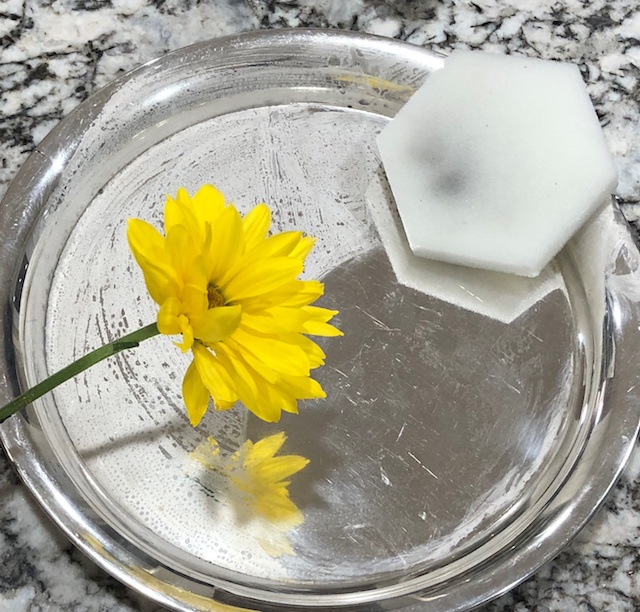 Have you ever been chugging along on your road of life, and suddenly find yourself flat on your back? I certainly have. One minute I can be tooling along, life seems to be going well, and the next, I am in an emotional tailspin. My self-confidence (and God-confidence) plummets. I then land in a pit of yuck. My wheels spin. My windshield is splashed with mud. All I see, all I feel is the negative – failure, hurt, loneliness, regret. What happened? I don’t usually know right away.
Have you ever been chugging along on your road of life, and suddenly find yourself flat on your back? I certainly have. One minute I can be tooling along, life seems to be going well, and the next, I am in an emotional tailspin. My self-confidence (and God-confidence) plummets. I then land in a pit of yuck. My wheels spin. My windshield is splashed with mud. All I see, all I feel is the negative – failure, hurt, loneliness, regret. What happened? I don’t usually know right away.
It is funny what brings it on, this pain, this darkening of the glass. It can be pretty random. Once, it was when I discovered I wasn’t invited to a wedding. (I know, right?) The funny thing is, I didn’t even want to go. But some friends were going, talking about it, making plans. And we were not included.
In a flash, my emotions were highjacked. My heart lurched off the road of contentment into a pit of despair. We have been excluded from other events, I remember. And then the scab from earlier wounds is ripped off … sitting by myself in the lunchroom…. alone waiting for the bus…. the only one in science class without a lab partner. My heart again feels that raw pain, rejection, loneliness. And then, Satan hisses these words, in a voice remarkably like my own “I don’t belong anywhere. I am not wanted. Or known. Or loved.”
Later that day, we went to church, but being in a big group where I knew almost no one, just reinforced that sense of detachment, of not belonging. I didn’t even know what was wrong. I just knew I couldn’t stay. So I left. And the rest of the evening, I withdrew into my woundedness, feeding it with chocolate and chips and Facebook and meaningless television.
The next morning, as I was praying, I was reminded: Yes, now I see through a mirror dimly…but I can see something – a good bit, actually.
And I begin polishing the mirror.
I start with giving thanks.
Not for this dark pain, deep within, that surfaces from time to time. But, thanking God that it surfaces, so that He can shine the light of His truth on it, and heal it a little more, or even altogether.
I recite the truth I know:
I meditate on some favorite verses.
Before long, God “pulls me out of the miry pit, and places my feet upon a rock.”
I pause for a little while, letting my emotions settle, reorienting to the path I am committed to travel. I take a deep breath, turning my face again to the future. And then I grab His hand, and take a step. And another one.
And I am on my way again.
Now, a little more whole. Now, seeing a little clearer, or a lot.
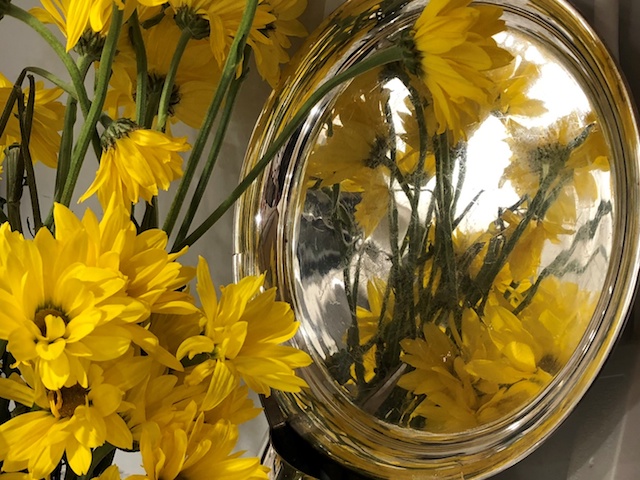 For now we see in a mirror dimly, but then face to face; now I know in part, but then I shall know fully just as I also have been fully known. 1 Cor 13:12
For now we see in a mirror dimly, but then face to face; now I know in part, but then I shall know fully just as I also have been fully known. 1 Cor 13:12
Two thousand years ago, a mirror was a highly polished piece of metal, maybe bronze or silver. Because it was hand-hammered and buffed, a person’s reflection in it would be imperfect – there would be distortions, and probably some dark spots. (Not that most of us really want total accuracy, when we look at a mirror, but that’s beside the point.) In those days, if you wanted a more accurate idea of what you actually looked like, you would need to step into the brightest light you could find and view your reflection from several different angles.
When Paul said “now we see through a mirror dimly” he was comparing our limited understanding of life/the world/our situation with the distorted reflection that one saw when looking at piece of polished metal.
Here’s the Amplified version of 1 Corinthians 13:12:
For now we are looking in a mirror that gives only a dim (blurred) reflection of reality as in a riddle or enigma, but then [when perfection comes] we shall see in reality and face to face! Now I know in part (imperfectly); but then I shall know and understand fully and clearly, even in the same manner as I have been fully and clearly known and understood [by God].
None of us have a clear picture of what is going on in the world – or even in our own lives. Our reflection is incomplete. There are blank spots and distortions. In order to get the best possible understanding, we need to inspect our situations from a variety of viewpoints, and in the brightest light we can find – the light of God’s truth.
But the great news is, God’s is not. He sees everything and, even better, He understands what it all means. He knows how it all connects. From His perspective, He can guide us along the wisest path forward. All we have to do is ask.
If any of you lacks wisdom, you should ask God, who gives generously to all without finding fault, and it will be given to you. James 1:5 NIV